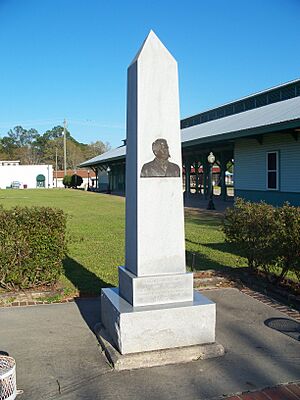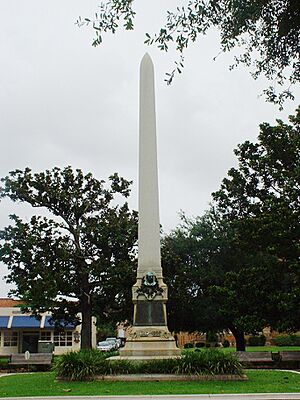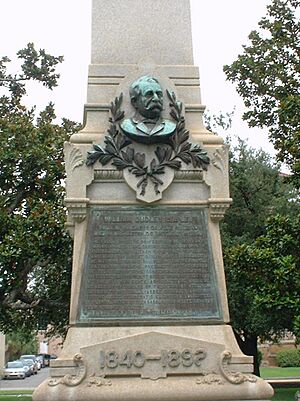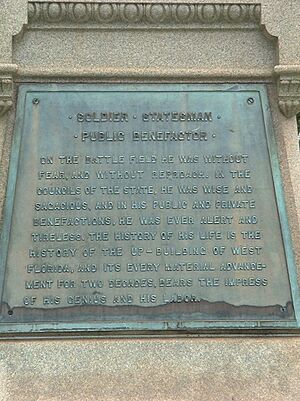William Dudley Chipley facts for kids
William Dudley Chipley (born June 6, 1840 – died December 1, 1897) was an important American leader. He was a railroad executive, meaning he helped build and manage train lines. He also served as a politician. Chipley played a big part in building the Pensacola and Atlantic Railroad. He worked hard to promote Pensacola, Florida, his adopted city. In Pensacola, he was elected mayor for one term. Later, he served as a state senator for Florida.
Contents
Early Life and Education
William Dudley Chipley was born in Columbus, Georgia. His father was Dr. William Stout Chipley, and his mother was Elizabeth Fannin Chipley. When William was four years old, his family moved to Lexington, Kentucky. He grew up there and attended two schools. He graduated from the Kentucky Military Institute. He also studied at Transylvania University.
Military Service in the Civil War
After finishing college, William Chipley joined the army. He became a soldier in the 9th Kentucky Infantry. He fought for the Confederacy during the American Civil War. He rose to the rank of lieutenant colonel.
Chipley was wounded in two major battles: the Battle of Shiloh and the Battle of Chickamauga. He was later captured during the Battle of Peachtree Creek near Atlanta. As a prisoner of war, he was held at Johnson's Island in Ohio. He stayed there until the war ended in 1865. After the war, he moved back to Columbus, Georgia. There, he married Ann Elizabeth Billups.
Building Railroads

After the Civil War, Chipley began working in the railroad business. He worked for the Columbus and Rome Railroad. Later, from 1873 to 1876, he worked for the Baltimore and Ohio Railroad. During this time, he moved to Pensacola, Florida.
In Pensacola, he became the general manager of the Pensacola Railroad. This was a 45-mile train line connecting Pensacola to the Louisville and Nashville Railroad. Chipley was also key in promoting and building the Pensacola and Atlantic Railroad. This new line, built between 1881 and 1883, connected Pensacola and the Florida Panhandle to the eastern part of Florida for the first time. Chipley became the vice-president of this important railroad.
Chipley's success in building railroads led to towns being named after him. In 1882, the town of Orange, Florida, was renamed Chipley in his honor. Also, a town near Columbus, Georgia, was named Chipley after he extended the Columbus and Rome Railroad tracks there. This Georgia town is now called Pine Mountain.
Public Service and Legacy
William Chipley was also active in politics. He helped create the Democratic Executive Committee in Muscogee County, Georgia, and was its first leader. Later, he led the Florida Democratic Executive Committee.
Chipley served as the mayor of Pensacola from 1887 to 1888. He also served in the Florida State Senate from 1895 to 1897. In 1896, he ran for United States Senator but lost by just one vote.
William Dudley Chipley passed away on December 1, 1897, during a trip to Washington, D.C.. He was in Washington to talk with lawmakers about bringing more industries to Florida. He was buried in Columbus, Georgia. The people of Pensacola built an obelisk in his honor in the Plaza Ferdinand VII. This monument remembers him as a soldier, statesman, and public benefactor.
Images for kids
 | Selma Burke |
 | Pauline Powell Burns |
 | Frederick J. Brown |
 | Robert Blackburn |





